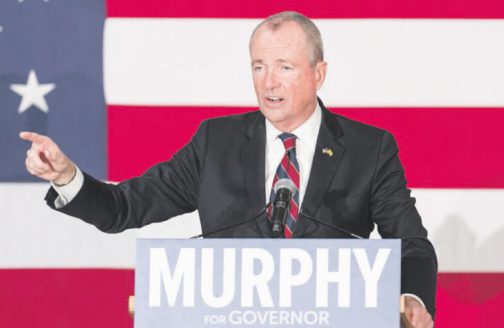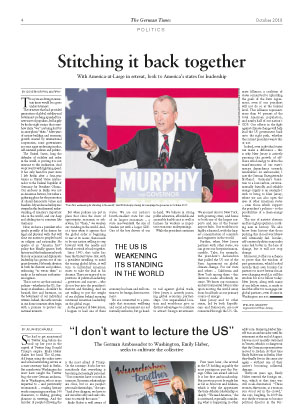With America-at-Large in retreat, look to America’s states for leadership

To say we are living in uncertain times would be a gross understatement.
The structure that had provided generations of global stability and betterment are being upended by a new wave of populism, fed largely by the far-right strains that somehow claim “we” are being hurt by an amorphous “them.” After years of nation-building and economic growth created by international cooperation, some governments are once again embracing insular, self-centered policies and politics.
The United States, long the defender of stability and order in the world, is proving it is not immune to this inclination. And we proved it with lightning speed. It has only been five years since I left Berlin after a four-year tenure as United States Ambassador to the Federal Republic of Germany for President Obama. Our embassy in Berlin was not an American fortress, but rather a gathering place for the promotion of shared democratic values and freedom. My ambassadorship was steeped in this fundamental understanding of America’s important role in the world, and our deep and abiding ties to countries like Germany.
Now, we have a president who speaks proudly of his desires for legal and physical walls that will close our nation to peoples based on religion and nationality. He speaks of an “America first” policy that blindly ignores both history and the fundamental truth that our economic and diplomatic leadership has grown out of our great diversity. He breeds division in both his rhetoric and policies, embracing “us versus them” as easily as he embraces authoritarian regimes.
This is not to say that national policies – whether in the US, Germany or elsewhere – shouldn’t be focused, first and foremost, on the betterment of our individual citizens. Indeed, the oaths we take in our home countries often begin with a promise to protect our national interests.
But when policies are put in place that close the doors of opportunity, economic or otherwise, for “them,” we weaken our standing in the world. And, at a time when it appears that the global order is beginning to tear at its seams, there needs to be one nation willing to step forward with the needle and thread to stitch it back together.
Since 1945, that tailor has been the United States. But, with a president unwilling to mend the tearing global fabric, it will turn to individual American states to take the lead in his absence. There are many of us in positions of political leadership – governors and mayors – who do not buy into the president’s rhetoric and thinking. And we are willing to put the weight of our abilities behind ensuring continued American leadership on the global stage.
As the governor of New Jersey, I happen to lead one of these states. We are our nation’s fourth-smallest state but one of its largest economies – a state one-twentieth the size of Sweden yet with a larger GDP. One of the key drivers of our economy has been and will continue to be foreign direct investment.
We are committed to a principle that economic wellbeing and social advancement are not mutually exclusive, but go hand-in-hand. We believe in strong public education, affordable and accessible health care as well as fairness for workers as important economic underpinnings.
While the president continues to rail against global trade, New Jersey is actively pursuing global economic partnerships. Our unparalleled location and workforce give us distinct advantages to continue to attract foreign investment. We are next door to New York, with growing cities, and home to both one of the largest seaports and one of the busiest airport hubs. Our workforce is highly educated, with the largest concentration of scientists and engineers in the world.
Further, when New Jersey partners with other states, we can grow our footprint immeasurably. Take, for example, the president’s declaration that pulled the US out of the Paris Agreement on global climate change. For our state and others – California and New York among them – this decision made absolutely no sense. We know our economic and environmental future relies upon moving the world away from fossil fuels as our primary source of energy.
New Jersey and 16 other states, led by both Republicans and Democrats, are now connected through the U.S. Climate Alliance, a coalition of states committed to upholding the goals of the Paris Agreement, even if our president will not do so at the federal level. This Alliance represents more than 40 percent of the total American population, and nearly half of our nation’s GDP. Our efforts in the fight against climate change will help lead the US government back onto the right path, whether the current president wants this or not.
Indeed, even individual states can make a difference – this is why New Jersey is actively pursuing the growth of offshore wind energy to drive the transformation of our state’s energy dependence towards renewables. As ambassador, I saw the German Energiewende firsthand. Germany’s transition to a low-carbon, environmentally friendly and reliable energy supply is an example I wish to bring to New Jersey, where we can also open the eyes of other American states – even those which support the president’s policies – to the possibilities of a clean-energy future.
The rise of nativist rhetoric and far-right populism is nothing new in history. We also know from history that those pushing this closed worldview will ultimately fail. Insular, self-centered politics may make some feel better in the face of change, but it will not stop change.
Moreover, it offers us a chance to prove that the wisdom of past generations, which looked outside their own borders for partners to move forward in an ever-changing world, is still the wisdom for us to follow today. New Jersey, along with many of our fellow states, is ready to lead this effort to re-engage our global partners, even if some in Washington are not.
Philip D. Murphy
is governor of New Jersey.




